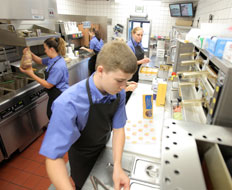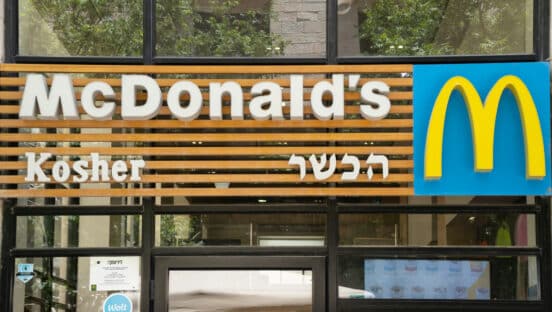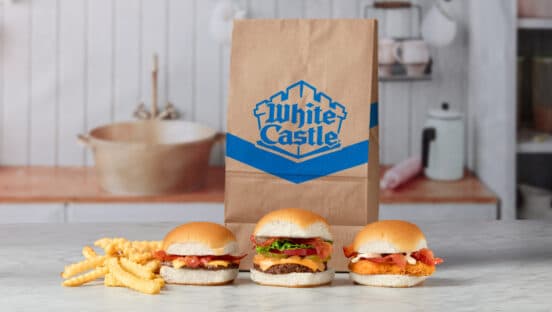Most businessmen study the leaders of their industry to gather tips on growth strategies. But many national quick-service chains are seeking advice from a regional burger chain populating rural towns in East Tennessee.
And the advice they’re getting seems to be working.
Pal’s Sudden Service has become something of a legend in the quick-serve arena, and for the last decade has shared its strategies with nonprofit organizations and businesses—including other quick serves—through its Pal’s Business Excellence Institute.
The Institute launched as a way for the Kingsport, Tennessee–based chain to share its success and teach best practices in everything from human resources to customer service, says Pal’s CEO Thom Crosby.
A 2001 Malcolm Baldrige National Quality Award validated the work at Pal’s and also placed a heavier emphasis on the chain’s role as teachers; Baldrige winners are expected to share their winning strategies with others. The Baldrige Award, given annually by the President of the U.S., recognizes private and public organizations for performance excellence.
At Pal’s Business Excellence Institute, participating operators can take courses in leadership, strategic planning, data analysis, customer service, and process management, among other areas. Courses become more individualized and follow-up consulting is more detailed as an organization’s relationship with Pal’s progresses.
“One of the big pieces is we will follow up with you and say, ‘How’s it going?’” Crosby says.
Robert Tortorice was immediately impressed the minute he walked into a Pal’s Sudden Service late last year. He was struck by the restaurant’s cleanliness, organization, and speed with which the small chain executed orders. His food was prepared within a matter of seconds.
“They’re like a finely tuned machine,” says Tortorice, COO of Jason’s Deli, one of the latest restaurant chains to learn from Pal’s Business Excellence Institute. “When you walk in you’re blown away.”
Jason’s Deli executives are determining ways in which Pal’s model of performance excellence can help their 234-unit chain.
Texas-based K&N Management, owner of Mighty Fine Burgers, Fries and Shakes and operator of four Austin-area Rudy’s Country Store & Bar-B-Q locations, was an early participant of the Pal’s Business Excellence Institute. Co-owner Ken Schiller says K&N leaders made about a dozen trips to Pal’s locations throughout the nine years they worked with the organization.
“Basically, they were our mentor and reference point from beginning to end,” Schiller says. “Our journey was just about getting better and wanting to be more like Pal’s.”
Schiller says the speed and efficiency of the Pal’s line gave K&N a new reference point of what was possible in their own restaurants.
“We can move our line now with more than double the speed,” he says. “We’ve pretty much reinvented everything we do. Everything’s much more aligned.”
While it may be unusual for quick-service restaurants to lean on other chains for training purposes, executives say their companies have gained valuable intel from working with Pal’s. And their results prove it.
“I knew very early on in the process that this is something that’s going to have a long-lasting impact on us,” Jason’s Deli’s Tortorice says. “It could take us from good to great.”
Schiller says sales at the company’s Rudy’s and Mighty Fine Burgers stores are now two-and-a-half times what they were when they started the Institute. What’s more, after completing Pal’s training, K&N Management won a Baldrige Award of its own.
A&W Canada, which sent a group of regional managers to learn from Pal’s how to boost its drive-thru business, saw millions in revenue increases after participating in the institute.
Neal Farmer, director of operations for the 750-store A&W Canada, says about 90 percent of A&W Canada stores implemented procedural changes in 2008, encouraged by the work with Pal’s. Those stores saw about $15 million in incremental annual revenue growth, totaling $45 million over three years, Farmer says.
Further, drive-thru sales at its 450 stores with drive-thru windows are growing three times as quickly as inside sales, a monumental shift considering that for years the two were about equal, he says.
“What we took away from Pal’s was how important the engineering of the processes were,” he says. “When you leave, you have a clear idea of what’s possible.”
As for Pal’s, the iconic burger chain doesn’t see financial gain in its Business Excellence Institute. Crosby says the company self-subsidizes its educational program and doesn’t rely on it as a revenue stream.
The real benefit is in the good Pal’s is doing for the rest of the industry.
“Our thought process was the stronger and the better companies could function around us, the more dynamic the economy would be,” Crosby says. “And the more people who are employed, the better the economy will be, the better for us.”








